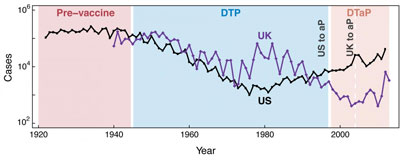Whooping cough resurgence due to vaccinated people not knowing they’re infectious?
Posted: 29 June 2015 |
Public health officials have blamed the waning effectiveness of the current vaccine and anti-vaccine sentiment as the cause of the whooping cough resurgence…


Whooping cough has made an astonishing comeback over the last few years.


The dramatic resurgence has puzzled public health officials, who have pointed to the waning effectiveness of the current vaccine and growing anti-vaccine sentiment as the most likely culprits.
But that might not be the whole story, suggests a new study. Ben Althouse and Sam Scarpino of Santa Fe Institute point to a different, but related, source of the outbreak – vaccinated people who are infectious but who do not display the symptoms of whooping cough, suggesting that the number of people transmitting without symptoms may be many times greater than those transmitting with symptoms.
In the 1950s, highly successful vaccines based on inactivated pertussis cells (the bacteria that causes whooping cough) drove infection rates down. But adverse side effects of those vaccines led to the development and introduction in the 1990s of acellular pertussis vaccines, which use just a handful of the bacteria’s proteins and bypass most of the side effects.
However, these newer vaccines might not block transmission. A 2014 study by another research team demonstrated that giving baboons acellular pertussis vaccines prevented them from developing symptoms of whooping cough but failed to stop transmission.
Acellular vaccines may allow infected individuals without symptoms to spread whooping cough
Building on that result, Althouse and Scarpino used whopping cough case counts from the US Centers for Disease Control and Prevention (CDC), genomic data on the pertussis bacteria, and a detailed epidemiological model of whooping cough transmission to conclude that acellular vaccines may well have contributed to, or even exacerbated, the recent pertussis outbreak by allowing infected individuals without symptoms to unknowingly spread pertussis multiple times in their lifetimes.


Pertussis cases in the United States from 1922 through 2012 and in the UK from 1940 through 2013. Shaded regions correspond to the pre-vaccine era, the DTP era, and the DTaP era, respectively. CREDIT: Courtesy of B. Althouse and S. Scarpino, Santa Fe Institute
“There could be millions of people out there with just a minor cough or no cough spreading this potentially fatal disease without knowing it,” said Althouse. “The public health community should act now to better assess the true burden of pertussis infection.”
Their model also shows that if the disease can be spread through vaccinated, asymptomatic individuals essentially undetected, the level of vaccination needed to protect those that are unvaccinated (so-called ‘herd immunity’) is over 99%, impractically high at a time when anti-vaccine campaigns are turning people away from vaccination.
Their results also suggest that a practice called cocooning, where mothers, fathers, and siblings are vaccinated to protect newborns, isn’t effective. “It just doesn’t work, because even if you get the acellular vaccine you can still become infected and can still transmit. So that baby is not protected,” Althouse explained.
Does this mean the current vaccine is useless? Not at all, the pair says. Until researchers can develop a new pertussis vaccine that blocks transmission, the protection the acellular vaccine offers to individuals is vital.
“It’s the symptoms of pertussis infection that kill people,” said Scarpino,“and the existing vaccine prevents the most debilitating effects of whooping cough.”
The study is published in BMC Medicine.




